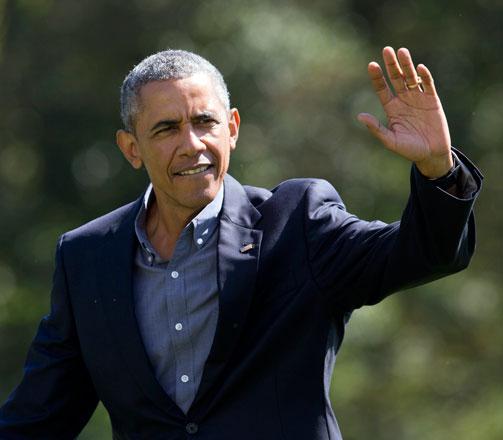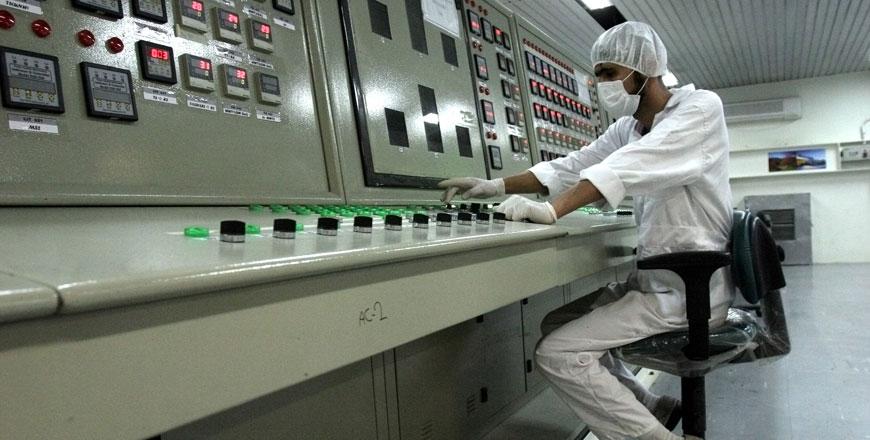You are here
Obama musters key 41 Senate votes for Iran nuclear deal
By Reuters - Sep 08,2015 - Last updated at Sep 09,2015

President Barack Obama waves as he walks on the South Lawn of the White House in Washington Monday upon his return from a Labour Day trip to Boston (AP photo)
WASHINGTON — President Barack Obama on Tuesday secured 41 votes in the US Senate for the international nuclear deal with Iran, just enough to block a final vote on a measure of disapproval.
Democratic Senators Richard Blumenthal, Gary Peters and Ron Wyden all announced they would support the agreement.
Their support along with that of 38 other Democratic and independent senators in the 100-seat chamber who favor the accord would be enough to block a Republican-backed resolution disapproving of the nuclear deal, between world powers and Iran.
That would keep Obama from having to use his veto power to stop the resolution and protect a deal seen as a potential legacy foreign policy achievement for his administration.
"This agreement with the duplicitous and untrustworthy Iranian regime falls short of what I had envisioned. However, I have decided the alternatives are even more dangerous," Wyden said in a statement explaining his backing for the agreement.
To block the resolution, deal supporters would need all 41 of the pro-deal senators to vote in favour of using the Senate's filibuster procedural rule to keep a disapproval resolution from advancing.
Some senators who have said they support the Iran agreement have said they would like it to receive an "up or down" vote, although it was not immediately clear if any would break with Democratic party leaders and oppose a filibuster.
Senate aides said deal opponents, including some pro-Israel groups, were waging a fierce lobbying campaign to keep as many as possible from backing the procedural measure.
Israeli Prime Minister Benjamin Netanyahu has been a vociferous opponent of the Iran nuclear agreement, calling it a threat to his country's existence.
Many opponents of the nuclear agreement, announced on July 14, have argued it offers sanctions relief in exchange for too few concessions from Iran on its nuclear programme They want the United States and the five other world powers who negotiated with Tehran to return to the table to push for a tougher agreement.
Iran denies its nuclear programme aims to produce weapons.
Procedural rule
Republicans, who control a majority of seats in the Senate and the House of Representatives, have denounced the idea of using the procedural rule to keep a disapproval resolution from advancing.
They note that the Senate voted overwhelmingly, with Democrats joining Republicans, for the legislation that lets Congress vote on a disapproval resolution.
"Cloture votes and artificial limits for passage should not be necessary on a vote that 98 Senators said they wanted to take," said Don Stewart, a spokesman for Senator Mitch McConnell, the Republican Senate majority leader.
Reid on Tuesday issued a ringing defence of the deal, and the use of the 60-vote threshold to block it.
"There is no plausible alternative. There is no better deal," Reid said in a speech at the Carnegie Endowment for International Peace.
Obama had been guaranteed enough votes to sustain a veto once 34 senators backed the agreement, but deal backers say avoiding the veto process would send an important message to Iran, and the world: That Washington is unified behind it.
If a resolution of disapproval were to pass, and Congress were to override Obama's promised veto, he would be barred from waiving many US sanctions on Iran. This would cripple the Iran deal, which exchanges relief from economic sanctions for Iran curtailing its nuclear programme.
Voting this week?
Senate and House members were to take up the Republican-backed Iran disapproval resolution as soon as they returned to Congress on Tuesday from their long August recess. The first votes in both chambers are expected this week.
Congress has until September 17 to pass the resolution. Obama then has 12 days to veto it and Congress has another 10 days to try to override his veto.
McConnell has asked Senate committees not to schedule any hearings so members can attend the debate.
A disapproval resolution is expected to receive the simple majority of votes it will need to pass the House, where Republicans hold 246 of the 435 seats.
House Democratic leaders have been working to marshal the 146 votes to sustain Obama's veto in that chamber. By Tuesday, they had at least 120, all Democrats.
No Republican in either house has announced support. About 20 Democrats also oppose it.
Senator Joe Manchin on Tuesday became the fourth Senate Democratic "no".
"While the deal places real constraints on Iran's nuclear programme for the next 10-15 years, after that term, Iran will be able to produce enough enriched uranium for a nuclear weapon in a very short period of time," Manchin said.
Maria Cantwell of Washington is the lone Democratic senator yet to announce her position on the Iran deal.
Related Articles
WASHINGTON — US Senate Democrats blocked legislation meant to kill the Iran nuclear deal for a third time on Thursday, securing perhaps the
WASHINGTON — As talks on an Iran nuclear deal enter the final stretch, US lawmakers are sharpening warnings against a "weak" agreement and l
WASHINGTON — The September vote on the Iran nuclear deal is billed as a titanic stand-off between President Barack Obama and Congress.












